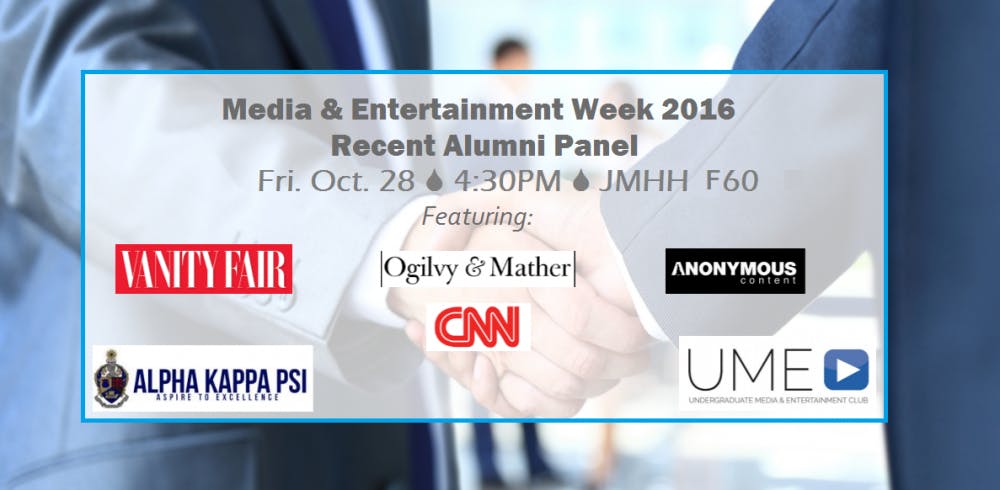Friday, October 28's afternoon alumni panel was the third event in Penn UME (Undergraduate Media and Entertainment Club) and Alpha Kappa Psi business fraternity's Media and Entertainment Week. Preceded by an info session by United Talent Agency and a talk by a representative of League of Legends, this panel of recent alums offered advice on how to break into the creative industry.
The event included two Quakers who graduated in 2016: Emily Lipson, currently a photo assistant at Vanity Fair, and Daniel Locker, a current freelance production assistant who has worked at Ogilvy and Mather and CNN in the past. Rounding out the group of speakers was Chadwick Prichard, a 2014 graduate who currently works at Anonymous Content.
Each member took the time to describe what they did at Penn and how it led them to their current careers. Daniel decided to become a communications major after he took Felicity (Litty) Paxton's famed class COMM123: Critical Approaches to Popular Culture, and also founded The Late Night at Penn. Emily split her time doing video and photo work for her dance group Strictly Funk, while balancing coursework in Visual Studies and doing some event photography on the side. Chadwick studied Marketing in Wharton and started an entertainment speaker series with AKPsi.
A common thread in all of their advice was the importance of internships and creating and sustaining networks of contacts. All three of the recent alums got their jobs through someone they either met in an internship during their undergraduate years, a family friend or someone they were put in contact with through an on–campus networking event. In Daniel's words, "The only product you're pushing is you." For this reason, the alums couldn't stress enough the value of freelancing for those self–starting young professionals with a strong sense of personal brand. In her five months at Vanity Fair, Emily has already met freelancers who operate just as efficiently without the corporate constraints, and Daniel spoke of people who have made a decent living freelancing for over 30 years.
The panelists' advice didn't skirt around the harsh reality of the entertainment business and the true standing of its entry–level workers. Daniel spoke of doing coffee runs, making calls and being a general extra set of hands around the shoots. "Do whatever they ask you so they get the shot," he offers, and "make friends at the jobs you work for." Chadwick’s method was similar: "Intern for a few months with people who will call in for you."
This humble work goes hand in hand with the requisite networking component of the media and entertainment industry, as you must not only work cheerily and rapidly, but you must ensure that your work leaves a lasting impression on the employers who hold your recommendation fate in their hands. In the magazine industry, Emily explains, it's all about what other people need. "You won't be in a creative role until you've earned it," she continued. And Chadwick, who spends much of his time tracking legal papers and reviewing talent deals, wasn't any more forgiving, saying "The first job is so hard."
But these young creatives broke into the industry, and the hardest part is behind them. They've found footing in an incredibly tough business and can only move upwards, and are confident that you can too. In their collective words: don't get scared if you don't get a job right away, put yourself last in your entry–level years, and for god's sake don't be a dick.

